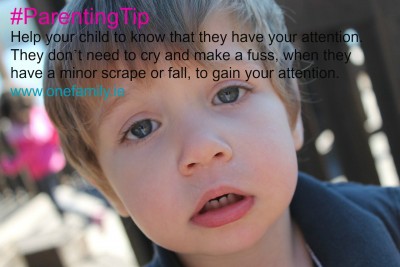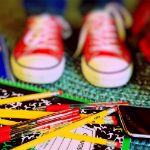Parenting Tips | Helping children to cope with bumps and bruises
 When it comes to minor scrapes and falls, some children brush them off easily. Other children stop and seek sympathy with every scratch and scrape. Children can often seek sympathy for attention. Most parents, no matter how busy they are, will stop whatever they are doing when a child cries out from an injury. Children learn very early that crying gets attention.
When it comes to minor scrapes and falls, some children brush them off easily. Other children stop and seek sympathy with every scratch and scrape. Children can often seek sympathy for attention. Most parents, no matter how busy they are, will stop whatever they are doing when a child cries out from an injury. Children learn very early that crying gets attention.
Another reason for tears after falls is that children enjoy the kindness of the care they receive: the nursing from a parent, the kiss and hug, the plasters. Most children see plasters as the crowning glory for their cut or scrape. The plaster can signal for a number of hours or days that an injury occurred gaining further attention that the child may need and enjoy. Some children have low pain thresholds and any bump or scrape could be of great sensitivity for them. Their coping skills could be very low around injuries or blood and they get upset. The upset could last anything from seconds to an hour or longer.
Most children have bumps and scrapes several times a day so how can you support your child to stay calm and react appropriately to the situation? Here, we offer ’10 ways’ to support your child through minor tumbles and scrapes:
- If you have a very young child who is just becoming mobile, try to stay calm when they tumble over. React slowly and check out what is happening as you approach them. Allow them time to assert themselves before you take over. They may recover without you grabbing them up and examining them all over. If they do get up by themselves, praise them by saying “You toppled over but look you managed to get up again, well done, let me check your head for bumps”. This is giving your child attention as required but also letting them know that they have coping skills.
- When children do have accidents, focus on what happened and try to console them without scolding them. There will be time later to talk to them about the dangers of what they were doing that led to the accident. When they are hurt is not the time. It is important that the child has not learned that there is more danger is seeking attention than what was inflicted from the injury.
- Remember that often the worry of what might have happened becomes bigger than what actually did happen. The fear creates a great level of anxiety for both the child and the parent.
- Acknowledge that they are hurt, praise them for bravery and treat the injury. This could be kisses, cuddles or plasters, or all three. Move on. Continue to talk about their bravery but continue to acknowledge the injury if they need that also. Don’t dwell on it. Focusing on other things such as how brave they were helps them to move on.
- When it comes to sports, coaches often say that more and more children are leaving the pitch in tears from injuries. Help children to know they will recover and that it wasn’t done in badness (by their opponent). In games tackles are hard but it is part of the game. Help them to understand the difference between intentional and accidental.
- Make sure you are giving your child lots of positive attention when they are playing well, helping you, or doing anything about the home and engaging with you. Help your child to see that they have your attention. They don’t need to be injured to gain your attention.
- Never withhold attention to an injury as you may miss an actual injury complication. Breaks and sprains are not always obvious in a child.
- Explore how you deal with injuries. Do you blame others for causing them? Do you look for sympathy or complain when you get none? We are our children’s role models so our children reflect our behaviour.
- Explore self soothing ways of dealing with injuries and feelings of sadness: a special blanket, a hot chocolate, a movie they like to watch. Self soothing is important for when they are older. Help them to find ways to support themselves and they will grown into resilient and strong adults.
- Point out to your child how well they cope at so many things in life: going to school, making friends, visiting the doctor and other everyday things. Then reinforce this when small injuries occur. Later you can give them the hug for coping so well when they relay the story of what happened.
- Remember, resilience is the key to good future mental health.
This article is part of our weekly ’10 ways to’ parenting tips, and is by One Family’s Director of Children and Parenting Services, Geraldine Kelly.
For support and advice on these or any related topics, call askonefamily on lo-call 1890 66 22 12 or email support@onefamily.ie.






